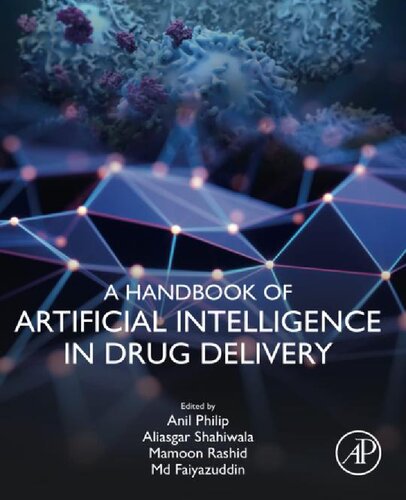Product desciption
A Handbook Of Artificial Intelligence In Drug Delivery Anil K Philip by Anil K. Philip, Aliasgar Shahiwala, Md. Faiyazuddin 9780323899253, 0323899250 instant download after payment.
A Handbook of Artificial Intelligence in Drug Delivery explores the use of Artificial Intelligence (AI) in drug delivery strategies. The book covers pharmaceutical AI and drug discovery challenges, Artificial Intelligence tools for drug research, AI enabled intelligent drug delivery systems and next generation novel therapeutics, broad utility of AI for designing novel micro/nanosystems for drug delivery, AI driven personalized medicine and Gene therapy, 3D Organ printing and tissue engineering, Advanced nanosystems based on AI principles (nanorobots, nanomachines), opportunities and challenges using artificial intelligence in ADME/Tox in drug development, commercialization and regulatory perspectives, ethics in AI, and more. This book will be useful to academic and industrial researchers interested in drug delivery, chemical biology, computational chemistry, medicinal chemistry and bioinformatics. The massive time and costs investments in drug research and development necessitate application of more innovative techniques and smart strategies.
Machine Learning (ML) is a subset of the umbrella term Artificial Intelligence (AI). AI has already crept into several tasks of our day-to-day life, like digital assistants, internet surfing, online shopping, etc. Machine learning (ML), as the name indicates, is a way (algorithm) of self-learning by computer. The development of ML algorithms originated from the quest of computers that learn on their own based on their experiences. The learning takes place with the help of a dataset provided to the computer as training data. It basically helps in decision making or prediction of an outcome when the situation is having manifold factors and when decision making is not straightforward as per human intelligence. Drug discovery and delivery is a complicated process requiring a lot of human aptitudes and decision-making ability. The process is characterized by abundant data handling with multiple variables, thus making it amenable to the application of ML. Opportunities for the application of ML occur at nearly all stages of drug discovery, like target identification and validation, compound screening, lead identification and optimization, preclinical development, clinical trials, and biomarker identification and analysis. However, for the effective application of ML, its basic understanding is inevitable. The knowledge and technology about ML in healthcare are advancing considerably. Various software libraries are available online that can work with a range of hardware, even simple personal computers. Proper understanding and selection of an appropriate Machine Learning approach may provide accurate predictions. This chapter will provide various ML approaches and their areas of applications with suitable examples. Several ambiguities in the available methods of ML are cropping up as these are being applied to actual situations in the healthcare sector.


